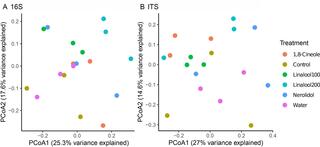Terpenes modulate bacterial and fungal growth and sorghum rhizobiome communities
M.-Y. Chou et al. "Terpenes modulate bacterial and fungal growth and sorghum rhizobiome communities" Microbiology Spectrum (2023) [DOI: 10.1128/spectrum.01332-23: e0133223]
Terpenes represent one of the largest and oldest classes of plant-specialized metabolism, but their role in the belowground microbiome is poorly understood. Here, we used a "rhizobox" mesocosm experimental set-up to supply different concentrations and classes of terpenes into the soil compartment with growing sorghum for 1 month to assess how these terpenes affect sorghum bacterial and fungal rhizobiome communities. Changes in bacterial and fungal communities between treatments belowground were characterized, followed by bioassays screening on bacterial and fungal isolates from the sorghum rhizosphere against terpenes to validate direct microbial responses. We found that microbial growth stimulatory and inhibitory effects were localized, terpene specific, dose dependent, and transient in time. This work paves the way for engineering terpene metabolisms in plant microbiomes for improved sustainable agriculture and bioenergy crop production.
The fungal ITS and partial LSU sequences have been submitted to NCBI under the accession numbers OQ434094-OQ434159, OQ456128, and OQ469489. Bacterial sequences have been submitted to NCBI under the accession numbers OQ509716–OQ509787. All demultiplexed amplicon sequencing reads have been submitted to the NCBI Sequence Read Archive under BioProject number PRJNA933671.
